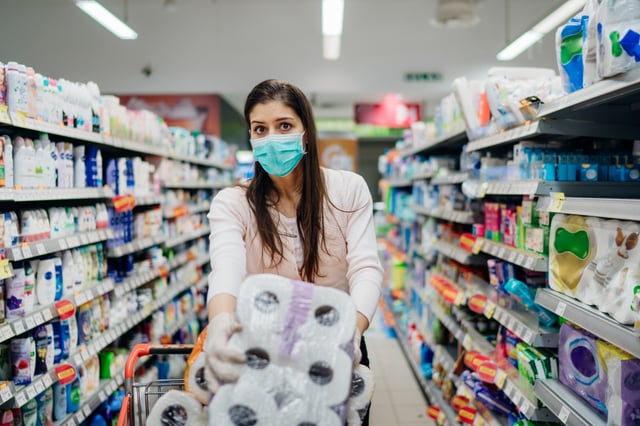Consumers Have Faith in Retailers, But COVID Worries Persist
The dunnhumby Consumer Pulse Survey, a multiphased worldwide study of the impact of COVID-19 on customer attitudes and behavior, found that retailers are doing well overall when it comes to dealing with the problems associated with the coronavirus. According to the study, national operators Walmart, CVS, Walgreens, Target and Kroger were the top-ranked retailers by U.S. survey respondents, but regional players Publix Super Markets, H-E-B and Aldi also performed well.
Despite this vote of confidence in retailers, the study also found that the U.S. “Worry Index,” which gauges how concerned consumers are about COVID-19, is now at 29%, a 6 percent increase since the third wave of the study, and nearly back to its original high point of 30% in March.
The customer data science company’s study additionally found that while 39% of those surveyed globally rated their national governments as doing a good job in regard to the crisis, just 25% of Americans surveyed have faith in their government’s actions during the pandemic. With the uptick in COVID-19 cases logged across the country since late May, U.S. respondents said that stores were doing a poorer job keeping them feel safe than in the earlier phase. At the same time, U.S. respondents also noted that they were less likely to practice preventive measures such as frequent hand washing (65%) or agree with restaurant closures (50%) and event cancellations (53%) as they did in earlier phases.
“Although worldwide, our Consumer Pulse Survey is finding that on a global basis worries about COVID-19 are declining, this latest update of the study shows that when it comes to the pandemic, worries are going back up in the U.S. and Mexico,” observed Jose Gomes, president of North America at Cincinnati-based dunnhumby. “This isn’t surprising, since the U.S. and Mexico are both struggling to contain the virus. In these uncertain times, retailers must fully understand how their customers are responding to each phase of the crisis, to meet changing needs. Retailers also need to be prepared to respond when regions experience spikes in new cases, which will likely return customers to previous behaviors from earlier phases in the pandemic."
Other major findings from the study included:
- Online grocery shopping and food delivery peaked during the pandemic, now representing nearly 35% of all U.S. trips, 19% of all Canadian trips, 39% of all Mexican trips, and 28% worldwide. Spurred by the adoption of e-commerce options and restaurant closures in the United States, in-person trips to stores now account for 65% of all food trips in or out of the home. Net satisfaction regarding online shopping has also grown since the first wave, with 45% reporting satisfaction in the latest wave, up from 27%.
- U.S. consumers are worried about the economy and rising food prices, as shown by the latest wave of the Consumer Pulse survey, which also found that 67% of Americans surveyed think the economy is poor – a 7% decline from wave 3. Seventy-five percent thought the government was doing a poor job dealing with the virus; 41% said that their personal finances are poor, with 48% spending more money on food; and 42% noted rising food prices since the onset of the pandemic.
- Satisfaction with the in-store shopping experience was higher than in previous waves of the study. Worldwide, 22% said that they were satisfied by the in-store experience, versus 35% in the United States, 32% in Canada and 31% in Mexico.
- A majority of consumers surveyed across the globe believed the media wasn’t exaggerating COVID-19 news, with 80% of U.S. residents, 87% of Canadians and 86% of Mexicans and 77% of consumers worldwide expressing that opinion.
“Unfortunately, with the surges of new cases in many regions of the world, we will not put this crisis behind us until a vaccine is widely available to the public,” added Gomes. “But, by understanding what matters most to customers by bringing together customer data and insights, retailers can help their organizations navigate and plan for the uncertainty ahead and respond to the evolving needs of their customers.”
For its study, dunnhumby surveyed more than 27,000 respondents online in 22 countries around the world: Asia (Australia, China, Hong Kong SAR, South Korea, Malaysia, Thailand); Europe (Czechia, Denmark, France, Germany, Hungary, Ireland, Italy, Norway, Poland, Slovakia, Spain, United Kingdom); South America (Brazil); and North America (Canada, Mexico, United States). The online interviews took place for wave one March 29- April 1, for wave two April 11-14, and for wave three May 27-31. Because of the rapidly developing crisis in North America, dunnhumby conducted another set of online interviews for wave four July 9-July 12 in the United States, Canada and Mexico only. Four hundred individuals were interviewed in each country for each wave of the study, approximately 60% of which were female, while 40% were male.
Walmart U.S. is No. 1 on The PG 100, Progressive Grocer's 2020 list of the top food and consumables retailers in North America, while Kroger is No. 3, Walgreens is No. 4, CVS is No. 6, Target is No. 7, Publix is No. 12, H-E-B is No. 17 and Aldi U.S. is No. 26 on PG's list.






